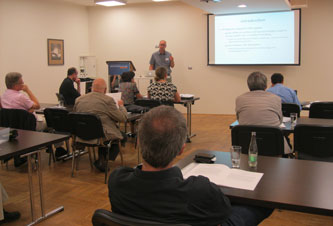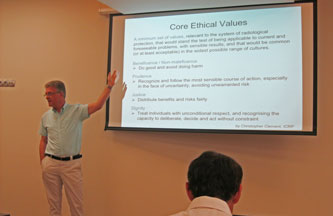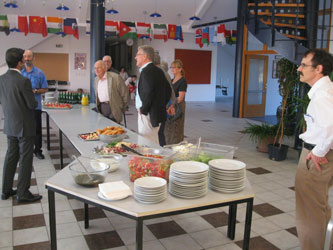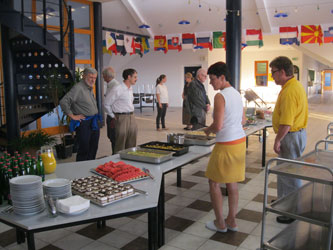
Newsletter of the
INTERNATIONAL ENVIRONMENT FORUM
Volume 18, Number 9 --- 15 September 2016
Website: iefworld.org
Article submission: newsletter@iefworld.org
Deadline next issue 13 October 2016
Secretariat Email: ief@iefworld.org General Secretary Emily Firth
Postal address: 12B Chemin de Maisonneuve, CH-1219 Chatelaine, Geneva, Switzerland
Download the pdf version
From the Editor, Request for information for upcoming newsletters
This newsletter is an opportunity for IEF members to share their experiences, activities, and initiatives that are taking place at the community level on environment, climate change and sustainability. All members are welcome to contribute information about related activities, upcoming conferences, news from like-minded organizations, recommended websites, book reviews, etc. Please send information to newsletter@iefworld.org.
Please share the Leaves newsletter and IEF membership information with family, friends and associates, and encourage interested persons to consider becoming a member of the IEF.
INTERNATIONAL ENVIRONMENT FORUM 20TH ANNUAL CONFERENCE
Nur University, Santa Cruz, Bolivia, 7-9 October 2016
Theme: Implementing the Sustainable Development Goals as communities and individuals
Registration is now open on the PERL/UNITWIN web site at https://eng.hihm.no/project-sites/living-responsibly/upcoming-conferenc…. There is a registration fee of US$140 for international participants to cover meals, coffee breaks and other conference expenses on 8-9 October.
The Annual General Assembly of the International Environment Forum will be held on 9 October 2016 at Nur University in Santa Cruz, Bolivia, where the affairs of the forum will be discussed and the Governing Board elected. Members will receive the Annual Report and election instructions a few weeks before the Annual General Assembly, so that they can vote by email if they are unable to attend in person.
The main sessions of the conference will be recorded on video for posting on YouTube after the conference so that all IEF members can benefit.
In addition, the October IEF Leaves newsletter will be delayed until about 20 October, so that we have time to prepare a report on the IEF conference and a summary of the Annual Report.
3rd International Symposium on Ethics of Environmental Health
Ceské Budejovice, Czech Republic, 28-31 August 2016
The 3rd International Symposium on Ethics of Environmental Health was held in Ceské Budejovice, Czech Republic, on 28-31 August 2016, organized by International Environment Forum member Friedo Zölzer of the University of South Bohemia. More than 20 specialists in medicine, physics, toxicology, epidemiology, environmental science, technology, philosophy, ethics, law and governance from around the world shared multidisciplinary perspectives on the interface between science and ethics in managing the risks that environmental factors present for health.
Environmental health encompasses the assessment and control of those factors external to the human body that can potentially affect health, such as radiation, toxic chemicals and other hazardous agents. The ethical frameworks and underpinnings that drive and also constrain underlying environmental health research and regulations are not always made explicit. The symposium discussed the ethical implications of science and technology for the application of research results in policy and regulations.
Topics of discussion ranged from nuclear accidents and epidemiology to climate change, and from the manipulation of scientific information by multinationals and politicians to community engagement in vector control.
 .
. 
3rd Symposium on Ethics of Environmental Health; organizer Friedo Zölzer
Three IEF members participated in the symposium. Friedo Zölzer spoke on "The Balance between Chemical and Ionizing Radiation Risks - Ethical Aspects". Arthur Dahl presented a paper on "The 2030 Agenda and Sustainable Development Goals: Placing Environmental Health in a Larger Ethical Framework", and Greg Dahl gave the concluding presentation on "Trust, Corruption, and Public Welfare".
One evening the symposium visited Hluboka Castle and had dinner at the Townshend International School.
 .
. 
Dinner for symposium participants at the Townshend International School
The rich discussion by leading experts concluded with recommendations for future research.
High-quality Multi-stakeholder Partnerships for Implementing the SDGs
IEF member Minu Hemmati is a leader in multi-stakeholder partnerships and has prepared the following blog at http://blog.felixdodds.net/2016/08/high-quality-multi-stakeholder.html .
By Minu Hemmati, CatalySD, and Felix Dodds, Global Research Institute, 16 August 2016
On the margins of HLPF 2016 in New York, Global Research Institute (University of North Carolina) and CatalySD held a workshop on “Multi-stakeholder partnerships for implementing the 2030 Agenda”.
We wanted to create an informal, safe space for dialogue among colleagues from the UN, governments, NGOs, multi-stakeholder partnership (MSP) initiatives, and partnership experts.
We looked at the history of the UN’s involvement with MSPs, and considered options of future engagement in the context of delivering the SDGs. We also discussed factors, forces and developments that may support, or hinder, effective contributions from MSPs. And we talked about next steps.
Much has been learned about engaging with partnerships since the first explicit inclusion of the Major Groups in Agenda21 in Rio, 1992, and hailing partnerships for implementation at WSSD in 2002. However, if we don’t carefully optimize the ways that the UN and UN processes engage with MSPs in the future, contributions will always remain side-lined and below the potential.
There’s a lot of praise, and a lot of criticism about MSPs – yet they are neither a panacea for solving all problems of sustainability, nor should they be generally equalled to privatizing development and abdicating government responsibility to profit-making business.
Many people are confusing Multi-stakeholder Partnerships and Public-Private Partnerships (PPPs). PPPs are contracts that a level of government takes out with usually a company to deliver. MSPs are voluntary agreements between different stakeholders.
They can help synergizing actions and moving away from silo operation, establishing clear inter-linkages of functions and mandates, thus achieving greater efficiency. In addition, political action across regularly forgotten dimensions (such as regional, local, sub-national governments, and urban & rural linkages), can foster greater cooperation among capacities at different levels.
In terms of next steps, safe spaces for developing thinking and strategy will be key because we need more and clearer guidelines and criteria to deal with MSPs.
Accountability and transparency are crucial to ensure due diligence, and that genuine contributions to the 2030 Agenda are being made while only those who deserve it benefit from engagement with the UN and the SDG processes.
In turn, MSPs should report about their successes and failures in efficient and cost-effective ways, delivering to their own controlling, learning, and communication needs at the same time. ‘Incentives’ was a key word in this discussion.
We see two possible ways by which a new set of guidelines and criteria could be agreed: The first way could be an ECOSOC agreement on Guidelines and Partnerships that could be agreed this year. The second is through the bi-annual Partnership Resolution in the UN General Assembly, which will come up for discussion in October 2017.
A summary of the workshop discussions can be found here.
As we will continue to host conversations about these topics, we very much welcome your comments and suggestions.
Please email us at minu.hemmati@catalysd.net and felix@felixdodds.net.
Sustainable Development and the Prosperity of Humankind: An important course for understanding humanity's future
Wilmette Institute, an On-line Baha'i Learning Center, 10 September to 28 October 2016. Faculty of IEF members: Arthur Lyon Dahl, Gary Colliver, Carole Flood, Christine Muller
http://www.cvent.com/events/sustainable-development-and-the-prosperity-…
• Explore the urgent need to make a fundamental transition away from a society and
economy that are threatening our planetary security
• Study sustainable development and seek to understand its profound implications
in achieving the prosperity of humankind
• Learn how to integrate sustainability into both the material and spiritual
dimensions of life
• Apply your learning to questions of everyday life and lifestyle
• Use it to start meaningful and distinctive conversations
• Incorporate it into community action, reflection, and consultation
• Review the economic, social, and environmental issues that humanity faces in
achieving sustainability
• Examine perspectives that show the unsustainability of the present system and
those that show the need for fundamental change
• Contrast the problems with the Baha'i vision of a new world order leading to
the prosperity of humankind
In Sustainable Development and the Prosperity of Humankind we will address the urgent need to make a fundamental transition away from a society and economy that are threatening our planetary security. From a Baha’i perspective, we will start with a general introduction to sustainable development and seek to understand its profound implications in achieving the prosperity of humankind. Our objectives include teaching ourselves how to think about sustainability by integrating both the material and spiritual dimensions of life into a long-term systems perspective; how to apply that thinking to questions of everyday life and lifestyle; how to use it to start meaningful and distinctive conversations; and how to incorporate it into our community action, reflection, and consultation. After studying the origins and definition of sustainable development endorsed by world leaders, we will review the economic, social, and environmental issues that humanity faces in achieving sustainability and discuss the spiritual principles that can help us find solutions. We will then examine perspectives for the future, both those that show the unsustainability of the present system, including the constraints that have limited women's contribution, and those that show the need for fundamental change--all contrasted with the Baha’i vision of a new world order leading to the prosperity of humankind. We will explore the implications of the new Sustainable Development Goals and the 2030 Agenda adopted at the United Nations. Finally, we will look at the importance, for sustainable development, of education reinforced with spiritual values as the basis for helping each of us detach ourselves from Western materialistic civilization; reexamine our present lifestyles; and begin to live more sustainably in accordance with the Baha’i teachings.
What is the Great Transition?
In the lingua franca of the Great Transition Initiative (GTI), “great transition” refers to a set of core concepts for understanding the contemporary world and shaping its future. The overarching framework is summarized below as responses to four iconic questions. The terms we favor are italicized, but cognates abound and are welcome. So, of course, is dissent.
Where are we? History has entered the Planetary Phase of Civilization, a profound shift in the condition of society and the dynamics driving change. In our time, multiple threads of interdependence — economic globalization, communications technology, and climate change are among the most salient — are binding people, places, and the wider community of life into a single social-ecological system. A new era emerges, yet the worldviews and institutions of the past persist, a disjuncture where crises incubate and a zeitgeist of apprehension spreads. At the same time, counter-tendencies — local initiatives, post-consumerist subcultures, sustainability and justice campaigns, public awareness and concern, visions of another world — may portend a rising social force for addressing the systemic challenge of the Planetary Phase.
Where are we going? Our common destiny remains indeterminate and contested. From the branch point of the present, contrasting paths into the future are possible, distinguished by the ways social-ecological crises and our collective response to them play out. These global scenarios fall broadly into three types: evolution, degeneration, and transformation. Evolutionary scenarios, or Conventional Worlds, envision incremental responses to twenty-first century challenges, with Market Forces variants stressing free market solutions and Policy Reform variants underscoring strong political will and international cooperation for sustainable development. However, the efficacy of market and policy adaptations is sharply constrained. A state-centric geopolitical order undercuts global imperatives, while the dominant development paradigm privileges profits over needs and economic growth over ecological resilience. Quite plausibly, Conventional Worlds could veer rather abruptly toward some form of Barbarization scenario, perhaps a polarized Fortress World, even a catastrophic Breakdown. The risk of evolutionary drift followed by catastrophic descent is all too real, yet by no means inevitable.
Where do we want to go? Transformative scenarios, or Great Transitions, envision the advent of a new development paradigm redirecting the global trajectory toward a socially equitable, culturally enriched, and ecologically resilient planetary civilization. This possibility rests on the ascent of a constellation of values — human solidarity, quality of life, and ecological sensibility — to moderate the conventional triad of individualism, consumerism, and domination of nature. Upon this normative foundation, governance and economic institutions can be redesigned to balance the imperatives for unity and diversity, to nurture social cohesion and eradicate destitution, and to support human well-being and a vibrant natural world. Far from the end of history, a Great Transition would be alive with peaceful political contestation, cultural expression, and scientific exploration. Even as it opened a new and hopeful chapter in the story of civilization, a Great Transition would face the lingering scars and instabilities of a fading past and the unfathomable struggles of a distant future.
How do we get there? A viable Great Transition strategy entails actions that address a vast matrix of issues at local, regional, and global levels. The very complexity of the social-ecological system urges an ecumenical change strategy that validates plural points of leverage as it seeks synergy and builds trust. The meta-challenge is to weave an integrated praxis from these many threads. A massive and coherent global citizens movement seems the essential systemic change agent for the Great Transition project. By forging a globalized community of fate with shared risks and opportunities, the Planetary Phase makes a broad cultural and political rising conceivable. Indeed, although still largely latent, such a movement is already visible in diffuse nascent forms. The core question is how to bring it fully to life.
http://greattransition.org/
To subscribe to their email newsletter, register on their website or contact Paul Raskin
- Great Transition Initiative gtibulletin@greattransition.org
Capacity-building Workshop on the "Sustainable City"
Kananga is the chief town of the new central Kasaï province in the Democratic Republic of Congo, with five communes, each one directed by a Communal Mayor. The Mayor of Kananga, Dr. Antoinette KAPINGA TSHIBUYI, after discussions with Mr. Jean Pierre BEYA DIBUE Ph.D, Professor at the Institute of the Medical Technology of Kinshasa and Rector of the Sustainable Development University (SDU), forged a partnership for the urban development of Kananga. Within this framework, the Town hall of Kananga and the SDU organized a Capacity-building Workshop for local authorities and civil society on the "Sustainable City" on Thursday 4 August 2016. The thirty-five participants included the Communal Mayors, the Head of the Urban Office of the Environment, Heads of communal offices of the Environment, group leaders and civil society representatives from the Communes, and assistants and section heads of the SDU. This University is virtual and functions in Kananga within the Interdisciplinary Center for Development of Further Education (ICDFE).
The provincial Minister in charge of the Environment, Mr. Médard NGONGI MAYOYI chaired the opening session. He welcomed the initiative of the Town Hall and the collaboration of the two institutions. He asked the participants to profit from the workshop and especially to put it into practice so that the town of Kananga will become a Sustainable City. Madam the Mayor of Kananga, Dr. Antoinette KAPINGA TSHIBUYI, in spite of her heavy workload, passed by the workshop to encourage the participants to assimilate the concepts of the Sustainable City well. She charged her assistant to follow the Workshop closely. There were three high points: keynote talks, workshop sessions, and sharing and exchanges in plenary.
The three keynote presentations were:
• The Sustainable City, by Professor Jean Pierre BEYA DIBUE Ph.D;
• Importance and future of trees in the town of Kananga, by the Chief of Works, Mr. NGALAMULUME;
• Challenges and opportunities from climate change, by Mr. KADIMA MPOYI LONG' SHA, Consultant to the Town Hall
In his talk, Professor Jean Pierre BEYA DIBUE Ph.D, Rector of the Sustainable Development University and president of the NGO Green Horizon, showed that Sustainable Development rests on three pillars: Society, Economy and Environment. He explained the characteristics of each and the interconnections between them. The purpose of a society is to meet the needs of its population in health, education, habitat, prevention of exclusion, and intergenerational equity. The economy must create wealth and improve material living conditions. And finally the environment must preserve species diversity, natural resources and energy. The intersection between the economy and environment generates a viable entity; the society and economy, an equitable entity; the society and environment, a livable entity; and between the three (society-economy-environment) a sustainable entity.
The participants were grouped by Commune to evaluate their communities in order to see whether they were sustainable. For his second talk, Professor BEYA DIBUE described the characteristics of a sustainable city. He stressed that a sustainable city must be seen as a system, developed and conceived so that the consumption of energy is reduced, natural resources (air, water) are preserved, pollution and waste are reduced, and parks provide habitats for fauna and flora, centered on the people and not on the vehicles.
The second presentation was by the Provincial Director of the ICDFE, the Chief of Works and Academic Secretary of the SDU, Mr. NGALAMULUME. He explained the importance and future of trees to Kananga. He shared the results of an investigation into the causes of deforestation in the town of Kananga. Brick-making is the first cause of deforestation, followed by making charcoal. He deplored the loss of trees and the consequences for the climate and recommended actions for afforestation in the city green belt.
The third and last speaker was Mr. KADIMA MPOYI LONG' SHA, Consultant to the Town Hall and Coordinator of the APRE NGO (Action for the Protection and the Reorganization of the Environment). He spoke on the Challenges and opportunities from climate change. After establishing the correlation between the global warming and climate change, he showed that any crisis contains in itself challenges and opportunities. While the climate crisis imposes a reduction in greenhouse gas emissions, it offers at the same time an opportunity to those who engage in efforts to reduce this threat. While everyone is called on to fight climate change, responsibilities need to be differentiated. Deforestation is considered the greatest source of greenhouse gas emissions in the RDC, but there is an increasingly large contribution to global warming in this country as a dumping ground for second hand goods. He emphasized the effort that needs to be made in addition to the fight against deforestation, so that the town of Kananga will be eligible for financing in proportion to the efforts provided, and asked that serious studies be financed to reinforce synergies. He suggested that the SDU help the local community to benefit from opportunities which the fight against climate change offers, by organizing capacity building for negotiable projects.
The exchanges in plenary were very profitable and the participants recommended that the partnership of Town Hall-DDU should continue.
KADIMA MPOYI LONG' SHA, Consultant to the Town Hall of Kananga
For photos, see the pdf version of the newsletter
Elevate – environmental theme of Questions for Meaningful Conversation
IEF member Charles Boyle has created an “Elevate” game designed to develop skills and confidence in meaningful conversations, and to make dinner table conversation more uplifting. "Elevate" began with a list of questions that has, as a result of trial and workshops, notionally evolved into a small-group "game" format to allow participants to develop generic skills and confidence in meaningful conversation. From this "Basic" resource, a series of themes have been developed to allow participants to cultivate those skills as well as explore that particular theme. An initial "Environmental" theme of questions is being made available via the IEF for those interested to trial, explore, play with and provide feedback, including suggestions for further questions, to enable the resource to be refined and enriched for wider use. If interested, please request a copy via email: elevatedconversation@gmail.com
Forest-burning is a sin, says Indonesian fatwa. Story reported around the world
15 September 2016
Indonesia's highest Islamic authority has said it is a sin for people to deliberately burn forests to clear the land for growing crops. The news, which was widely reported around the world yesterday, by news agencies, newspapers and radio/news stations including the BBC, described how the Indonesian Ulema Council (MUI) had issued a fatwa, or religious edict, stating that it was forbidden to burn forests.
Illegal slash-and-burn farming has devastated large areas of Indonesia and causes air pollution which affects countries around the region. The fires are started deliberately in order to quickly clear land for palm oil and pulpwood plantations. But they create smog in Singapore, Sumatra and the Indonesian part of Borneo during the dry season. In 2015 the fires and pollution were among the worst in memory cloaking large areas of Indonesia, Malaysia and Singapore in choking smog for weeks.
Indonesia has repeatedly been accused of not doing enough to stop it. Government officials said they hoped the moral impact of the fatwa would help reinforce laws against it.
The fatwa was the concept of the Indonesian Ulema Council (MUI) with the help of ARC, and ARC's local partner, the Centre for Islamic Studies (PPI) at Indonesia's National University. MUI is now in talks with the Indonesian environment ministry on how to enforce it.
Hayu Prabowo, head of environmental protection at MUI, said that most of the forest burning was done by companies, but Indonesia's Muslim leaders declaring it haram, i.e. forbidden by Islamic law, should allow the public to feel empowered to stand up to them.
While not legally binding in Indonesian secular law, the fatwa is firmly based on Islamic law and tradition and is binding within that context. It gives strong guidance to Indonesia’s Muslim population on how forest protection fits in with their core beliefs and values.
"This fatwa will make religious leaders and the general public who in the past didn't care, care and start to take responsibility to end forest burning in their area," he said.
"I'm excited and proud that our work has led to a Muslim response to the fires that are burning so much of Indonesia's forests and peatlands," said ARC's programme director, Chantal Elkin. "I hope it will help Indonesians feel more empowered to take action against agricultural land clearing."
ARC, PPI and WWF Indonesia are following up this high level edict with on the ground awareness raising among clerics and community leaders near priority conservation sites in Indonesia to translate the edict into on the ground conservation action amongst Muslim communities.
In the past, environmental fatwas issued in Indonesia have been taken up later in, or adapted for use in Malaysia. For example, based on the success of the 2014 fatwa on threatened species in Indonesia, the Malaysian state of Terengganu passed Malaysia's first wildlife trade fatwa in late 2015. The team is now partnering with the local NGO Rimba and the University to follow up on awareness-raising using the Indonesia methodology.
Earlier environmental fatwas
In 1992, in response to the growing use of imported rhino horn for making ceremonial jambiya daggers, the Grand Mufti of Yemen issued a fatwa against killing animals unless for meat or self-protection. In 2006/2007 the MUI issued a fatwa on illegal logging and illegal mining, via its regional council in Kalimantan region, Sumatra. This was followed in 2011 by a national fatwa on “Environmentally Friendly Mining”.
In March 2014(MUI) issued a fatwa requiring the country’s 200 million Muslims to take an active role in protecting threatened species including tigers, rhinos, elephants and orangutans. The fatwa reinforces the Indonesian government’s policies on preserving and protecting threatened animals and is aimed at providing legal certainty on the question of Islam’s perspective on animals classified as “vulnerable”, “endangered” or threatened with extinction.
“This fatwa is issued to give an explanation, as well as guidance, to all Muslims in Indonesia on the sharia law perspective on issues related to animal conservation,” said Dr Hayu. “Animals are viewed in Islam as being key parts of an ecosystem that in the end, also benefits the livelihood of human beings,” Dr Hayu added.
http://www.arcworld.org/news.asp?pageID=821
Updated 15 September 2016
|
